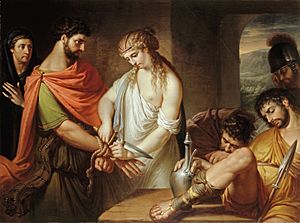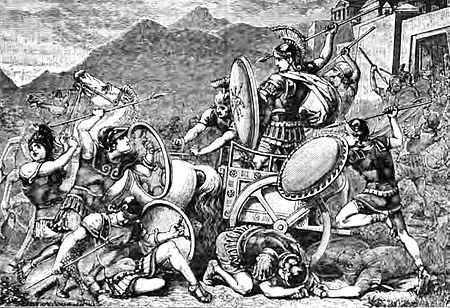Aristomenes facts for kids
Aristomenes was a brave leader and king from Messenia, an ancient region in Greece. He is famous for leading his people in a long and difficult fight against the powerful Spartans during the Second Messenian War. This war lasted for many years, from about 685 to 668 BC. Aristomenes and his followers bravely defended their mountain stronghold, Mount Eira, for 11 years. Even though the Spartans eventually captured the mountain, Aristomenes managed to escape. Legend says he was taken by the gods, but he actually died in Rhodes.
Contents
Aristomenes's Life and Battles
Aristomenes belonged to an important family called the Aepytids. He was the son of Nicomedes (or Pyrrhus) and Nicoteleia. He played a big part in starting the revolt against Sparta. He also helped get other Greek cities like Argos and Arcadia to join the Messenians.
Early Heroism
Aristomenes showed amazing courage in the very first battle at Derae. Because of his bravery, the Messenians offered him the crown to become their king. But he only accepted the title of commander-in-chief, meaning he would lead their army.
His daring spirit was clear from a famous story: one night, he secretly went into Sparta itself. He went to the temple of Athene, a goddess, and left his shield there. On the shield, he wrote: "Dedicated to the goddess by Aristomenes from the Spartans." This was a bold challenge to his enemies!
Major Victories and Defeats
Aristomenes's skill helped the Messenians win a big victory against the Spartan and Corinthian armies at a place called "The Boar's Barrow." However, the next year, the Messenians suffered a terrible defeat at "The Great Trench." This happened because the Arcadian king, Aristocrates, betrayed them.
After this loss, Aristomenes and the remaining Messenian fighters retreated to the strong mountain fortress of Eira. They managed to hold out against the Spartans there for eleven years.
Escapes and Legends
Aristomenes was captured more than once, but he always found a way to escape!
- The Chasm Escape: Once, he and 50 of his companions were captured and thrown into the Caeadas. This was a deep pit on Mount Taygetus where criminals were thrown. Aristomenes was the only one who survived! The legend says an eagle helped him fall safely, and he escaped by grabbing the tail of a fox. The fox then led him out through its burrow.
- The Girl's Help: Another time, he was captured during a ceasefire by some soldiers from Crete who were helping the Spartans. He was only set free because a brave Messenian girl helped him. She later became his daughter-in-law.
The Fall of Eira and Final Days
Eventually, Eira was betrayed to the Spartans in 668 BC. After a final, heroic fight, Aristomenes and his followers had to leave Messenia. They found a temporary safe place with their allies in Arcadia.
Aristomenes then planned a daring attack to capture Sparta itself. But again, Aristocrates betrayed him, and this time, Aristocrates paid for his treachery with his life. Aristomenes then moved to Ialysus on the island of Rhodes, where his son-in-law, Damagetus, was king. He died there while planning a trip to seek help from the kings of Lydia and Media.
Other Stories About Aristomenes

Some stories say that Aristomenes was captured and killed by the Spartans during the war. However, most historians believe he did exist. His story, as told by the ancient writer Pausanias, includes many exciting but perhaps not entirely true parts. These stories likely became popular after the city of Messene was founded again in 369 BC.
Aristomenes was greatly honored. A statue of him was placed in the stadium in Messene. His bones were brought from Rhodes and buried in a special tomb. Even more than 500 years later, people still honored him as a hero, and his adventures were popular in songs.
Interestingly, the explorer Richard Francis Burton believed that one of Aristomenes's pit escapes inspired a story about Sinbad the Sailor in the famous Arabian Nights collection!
Aristomenes in Literature
Aristomenes is the main character in a play called Messene Redeemed (1940). This play was written by F. L. Lucas and is based on the history of Messenia, drawing from Pausanias's writings.
See also
 In Spanish: Aristómenes para niños
In Spanish: Aristómenes para niños


